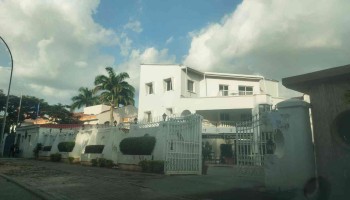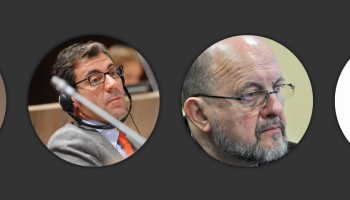Belgian company Semlex Group paid a former top official in Madagascar’s government at least $140,000 — and possibly much more — in unexplained fees, according to leaked company emails that appear to show a quid pro quo to secure a lucrative contract to produce passports.
Semlex, which provides biometric products to the likes of the United Nations and European Union with the stated aim of combating fraud, already has a scandalous track record in Africa, where it has been repeatedly accused of involvement in corruption. OCCRP has previously exposed how the company bribed senior officials to secure state contracts from Gambia’s former dictator, Yahya Jammeh, and helped a major oil trader pay kickbacks to win business in the Republic of Congo.
Now a new investigation can reveal Semlex used a similar playbook in Madagascar, where it secretly funneled cash to a former government official, Lucien Victor Razakanirina, who contracted them as suppliers to the East African island nation while serving as Secretary of State for Public Security.
Leaked account statements obtained by OCCRP show Semlex paid Razakanirina more than 120,000 euros (about US$140,000) between 2007 and 2009 in a series of unexplained transfers and monthly “consulting fees.” Figures from internal emails suggest he also received a monthly stipend of several thousand euros during 2010 and early 2011.
Approached by reporters, 75-year-old Razakanirina confirmed that he works with Semlex as a consultant, but declined to provide comments for this article.
In 2010, Semlex recruited another high-level official, Hyppolite Rarison Ramaroson, to represent its interests in the government. When Ramaroson was kicked out of office, Semlex’s regional director at the time hatched secret plans to get him back in power.
Today, Semlex is still making Madagascar’s passports, which cost the equivalent of a month’s salary for a Malagasy making minimum wage in a country where most people live on less than $2 a day.
“Certainly the price, at 190,000 ariary [around US$50], is very expensive compared to what we earn in Madagascar,” said Marie Lucie, a teacher whose daughter lives in Germany.
“My passport just expired — that is to say, I will need to pay this sum again. When I first got my passport, the price was 128,000 ariary, so this price increase will surely affect my budget."
Semlex representatives in Madagascar declined to comment, citing instructions from headquarters. Several government officials did not respond to requests for comment on this article.
Secret Payments
Semlex made its first overtures to Madagascar’s government more than a decade ago, after the company began to expand into Africa in the early 2000s.
In May 2006, Semlex invited Razakanirina, then a government minister, to travel to its headquarters in Brussels for talks about producing passports. Madagascar’s government signed a contract with the company that same month and less than a year later, in February 2007, it began to produce the documents.
It was a favorable deal for Semlex that included free office space, tax-free profits, and customs exemptions for any cash from the deal that the company moved out of the country. Of every passport sold for 60,000 Malagasy ariary, which at the time translated to around 22 euros, the company would keep 15.50 euros. Semlex renegotiated their cut, adding an extra euro per passport, months before beginning production.
The cost of making the passports was far more modest. Contracts show that between 2006 and 2009 Semlex was sourcing blank booklets from French state-owned printing firm Imprimerie Nationale for 2 euros or less apiece — a fraction of the cost it was charging Malagasy citizens.
Under the terms of their arrangement, Razakanirina — who left his government post in January 2007 — was also set to receive about 2 euros per passport, for no clear reason.
Internal documents, including emails and accounting ledgers, show Semlex paid him thousands of euros in a series of transactions. They include two payments in 2007 totaling about 23,900 euros, which the company labeled as “internal costs” in accounting records and correspondence obtained by OCCRP. In January 2008, Semlex transferred Razakanirina around 19,600 euros without stating a reason. The following month, a local employee sent him 6,500 euros, listed in the company's accounts as "exceptional costs.”
Some of the payments were made to Razakanirina’s French bank account from Semlex Europe S.A., while others were handed to him in cash by Semlex staff. When 7,000 euros was mistakenly sent to him from a Semlex account in Madagascar in November 2008, he appears to have panicked. He turned to Semlex’s then-regional director for Southern Africa and the Indian Ocean, Guy Ramahay.
“I already spoke to Lucien this morning,” wrote Ramahay in a November 28 email to Michele Bauters, the company’s finance director. “[He was] a little worried, but I told him to prepare a service provision invoice for an intervention as an advisory consultant in Africa” to justify the transfer.
In total, according to two emails from Razakanirina to Semlex’s finance director, the company paid him at least 122,000 euros between May 2007 and November 2009.
Tsanta Randrianarimanana, a senior judge and former Secretary General of the Malagasy Ministry of Justice, said payments from a private company to a minister in this context are “completely illegal” under Malagasy law.
“Whether the investigations are directed towards the Minister's account or even better are interested in the accounting operations of the company from which the transfer in question emanates, corruption no longer needs to be proven. It is well constituted,” he said.
Then, in 2009, Razakanirina emailed Semlex Group CEO Albert Karaziwan requesting the payments be changed to a monthly stipend of 3,500 euros as compensation for his services.
“That way I would be more financially comfortable and I wouldn't have to bother you every time ... I would be the SEMLEX consultant in the Indian Ocean area, as you said, and I could help your (very efficient) agent in Tana if needed,” he added, using a common shorthand for Antananarivo.
He appears to have got his way, receiving 3,500 euros a month until early 2011, when Ramahay, the Semlex regional director, emailed Karaziwan saying that he had proposed reducing Razakanirina’s monthly fees.
“Tana doesn’t bring in much compared to the Comoros, while the Comorian price is more than double that of Tana,” he wrote, referencing Semlex’s controversial dealings in the tiny island nation of less than one million, adding: “And the number of passports issued in Comoros has exceeded that of Tana.”
The next day, Karaziwan approved cutting the payments to Razakanirina to 2,750 euros a month.
If this monthly stipend has continued since then, that means he would have been paid hundreds of thousands of euros over the years. Razakanirina confirmed to OCCRP that he still consults for Semlex, but declined to comment on how much he has been paid. He also declined to explain the work he does for Semlex.
A Family Affair
‘Occult Missions’
Razakanirina left his cabinet post in January 2007, after Semlex secured its government contract. It’s unclear what he did after leaving office, but Madagascar’s register of commerce lists him as a manager of Import-Export Hery S.A.R.L., a company created in 2001 that claims to import food and export local products, including wood. OCCRP was unable to confirm if it does any actual business.
Semlex continued to pay Razakanirina over the years, but his political influence was clearly waning. The company missed out on a contract to supply ID cards in 2007, despite his support, and the following year a Semlex employee in Madagascar informed Karaziwan and Ramahay that another company had won a tender they didn’t even know was in play.
After a transitional government led by current President Andry Rajoelina seized power in 2009, Semlex recruited a new insider. This time they chose Vice Admiral Hyppolite Ramaroson, Madagascar’s then-Minister of Foreign Affairs and one of the country’s three vice prime ministers.
Ramaroson had a reputation for being "very corrupt,” according to a 2010 U.S. diplomatic cable published by Wikileaks, which claimed he was linked to “past abuses of power and bribery concerning [U.S. government] assistance programs.”
The month after Ramaroson assumed office in February 2010, he nominated Karaziwan to be special advisor to Madagascar’s Ministry of Foreign Affairs. An official from the ministry said the Semlex CEO is no longer in the position, but did not provide proof.
Ramaroson was removed from his post as vice prime minister a year later, due to what Ramahay described in an email to Karaziwan as “political motives.”
Ramahay urged the Semlex CEO to help get Ramaroson reinstated in his powerful post, arguing he could play "a crucial role in lobbying.” In an email, Ramahay said the former minister had suggested that "Belgian deputies, European deputies, Presidents" sign a letter to President Rajoelina denouncing his removal from the government.
In return for Semlex’s backing, Ramahay claimed Ramaroson had agreed to take part in "roles and occult missions" — possibly a reference to acting as a covert company representative — to build a close relationship with President Rajoelina, and gain his support.
Eleven days later, Ramahay suggested another ploy to Karaziwan, proposing that Semlex help Ramaroson with his plans to stand in the 2011 presidential election, which was later postponed.
“The Admiral and the party he will represent have found a radio TV [station] for sale. They are looking for the equivalent of 30,000 euros,” he wrote. “What I suggest, instead of [being] a sponsor, we participate in the shareholding in this radio TV station for this amount. They already have the staff.”
It’s unclear if Karaziwan ever responded to the suggestion that the company provide financial support to Ramaroson, but he did not run for president and never held another government position again.
Ramaroson could not be reached for comment.
Blue Sky Ambitions
‘They Thought It Was Fake’
In 2013, Semlex’s contract to make Madagascar’s passports was renewed for another decade. According to Reuters, the new deal allowed Semlex to receive 33.75 euros per document -- double the previous arrangement.
Despite Semlex’s ongoing operations in Madagascar, its services have been beset with problems. In recent years the company has delayed issuing passports more than once, reportedly because of issues with its production unit.
Citizens of Madagascar have also complained that Semlex’s passports continue to pose technical problems.
A 35-year-old business owner, who asked not to be named because she fears retaliation, said she tried to visit family in Germany and France in 2018 and was initially turned away because officials struggled to scan her documents.
“When I arrived at Frankfurt airport, I was denied entry as I was told by custom officers that my passport was fake, even though I [had] followed the normal procedure to get it,” she said.
"They told me they checked with other airports and were told that this [type of] case is very common with Malagasy passports. I was very upset!”









